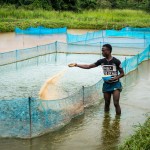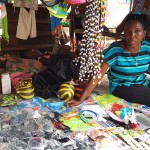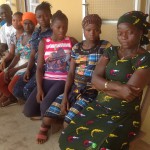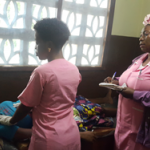Speeches Shim

The fish available in the local markets are often dried and smoked marine fish of poor hygienic and nutritional quality due to long-distance transportation from the country’s Western Area. Income-generating activities in the district are limited, especially now with a decline in mining. Households rely largely on subsistence farming, which does not provide enough diversified food. This has further exacerbated malnutrition in women and children (especially girls), who often have less access to animal protein compared to male heads of household, suffocating their growth potential.

Wanday Bangura’s stall in a bustling market in the Bombali district of northern Sierra Leone is full of shoes, jewelry, scarves and other products displayed for sale. Her small enterprise is flourishing.
“We have money to eat … and buy market items to sell. So we tell God thanks,” she explained.

Women in Lowoma village, a remote chiefdom in Kenema district, eastern Sierra Leone, are among the poorest in the country. Their most important means of generating family and community income include petty trading and peasant farming.

Sussex, a coastal fishing village in the Western Area Rural district of Sierra Leone, is one of many communities that were affected by Ebola. Before and during the disease outbreak in 2014-2015, the village’s health post for pregnant, lactating mothers and children under 5 was in a deplorable state. The facility had no running water because the only available water pump had broken down and not been repaired, there was no incinerator, the latrines were dilapidated, and there was no bathroom in the delivery room.
As in most parts of rural Sierra Leone, women in Koinadugu district have been relegated to the background by broad social and cultural constraints. As a result, they are not just denied social recognition, but suffer economic and political disempowerment as well.
Pages
WOMEN REALIZE THEIR RIGHTS IN RURAL SIERRA LEONE
As in most parts of rural Sierra Leone, women in Kabala , Koinadugu district feel the impact of poverty disproportionately with customary laws and widely held cultural and social beliefs acting as significant barriers to women’s full integration in decision - making sphere at the household, community and national levels.
Saio Mansaray, 42, is a social worker and former teacher in Kabala. A married mother with two children, she is also a participant in the USAID-funded Women Empowered for Leadership and Development (WELD) project. Since its inception in September 2014; WELD has conducted leadership and mentorship training sessions across operational areas. Women participants including traditional leaders and councilors, learned advocacy and leadership skills from January 2016 through to December 2016.
After two years of repeated meetings and training on issues affecting the rights of women, Saio and other women have acquired the skills and knowledge on how to be bold and speak in public to advocate for women’s right and actively participate in decision making process. Traditional leaders and councilors (male Champions) have also received training on their roles and responsibilities to increase women’s participation in decision making. They were educated on the importance of women realizing their rights and the tremendous benefits female participation and involvement in community decision making would bring.They were also shown how granting land inheritance and ownership to women would positively influence family income, as women can freely engage in farming and selling farm produce to increase household earnings.
According to Saio, she now has the confidence and has practiced and applied the skills she acquired during the training sessions to engage authorities on Women’s issues and speak to large crowds of women and men to educate them on their rights and advocate for delivery of services. “Now, a new dawn begins to unfold for the women and girls in Kabala, Koinadugu district,” says Saio. “It was a taboo here for a woman to inherit or purchase land, or even rent a house in her own name, stand for a political position or speak in meetings. Today, I thank the WELD project and the American people for giving me this opportunity Right now; I'm not only a political aspirant, but also a land and livestock owner. We are grateful to USAID.”
The Women Empowered for Leadership and Development project, which runs from September 2014 to September 2017, is designed to increase women’s political social and economic rights in Sierra Leone. WELD has reached out to 3.8 million Sierra Leoneans.


Comment
Make a general inquiry or suggest an improvement.